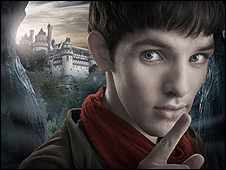Who Was Merlin? — Part 1
This is a question that has fascinated people throughout the ages.
I recently read an article on the BBC News website, titled “Merlin myths and links with Wales“.
This article was prompted by the introduction of a new television series “Merlin – The Legend” (produced by the BBC, of course) about a young Merlin aiding a young Arthur, yet the article shies away from the TV show and sticks mostly with history.
Or does it?
Not quite. Although they deal with the history of Merlin in this article, they put a modern, political, academic leftist interpretation on the creation of the Merlin myth. To the researchers quoted in the article, Merlin was:
- “a figment of Geoffrey of Monmouth’s imagination to justify why [the new Anglo-Norman aristocracy] were conquering [Britain]”
- “used to bring stability to the country after the wars of the Roses”
- “a romantic figure … overwhelmed by the seductive wiles of a woman … perfect for the 19th Century because of the strong gender polarities”
- “used by the Nazis to create their own myths and national identity”
- “[taken by] JRR Tolkien and CS Lewis … to wage a literary war on the Nazis”
- “[today] Merlin has really become a Shaman [to meet the spiritual desires of the 21st century]”
These answers are attempts to explain Merlin’s creation based on the politics, money, and power of whatever era the myth was rewritten.
This leftist view of artistic creation is rather lifeless and cold.
That is not to say that these factors did not influence the myth, but (aside from any Nazi propoganda) why should we ignore the God-given desire for an author to create a beautiful story?
The stories of Geoffrey of Monmouth (Historia Regum Britanniae) and Thomas Malory (Le Morte d’Arthur) are just plain beautiful in their own right, and I personally want to appreciate the artistic vision that these men had.
Two things the BBC article got mostly right were the following two points. Merlin was:
- “[a merging of Merddyn] Ambrosius, [and] the bard Merddyn Wilt”
- “a druid and bardic figure”
Certainly for Geoffrey of Monmouth the first point is true, for their are two different Welsh variations of Merlin: Myrddin Wylt (the wild), and Myrddin Ambrosious. And in my opinion, this was Geoffrey’s genius, not his confusion. What re-teller of tales does not attempt to synthesize his source texts?
However, was Merlin a Druid? I will cover this in Part 2, so go ahead and click.



I like this point you made:
“why should we ignore the God-given desire for an author to create a beautiful story?”
Having college English courses myself, I totally come away with a new understanding of textual criticism. It seems anyone with a degree in hand can tweak the meaning of a text to whatever particular political/social/etc.
I came away with a strong sense that often times, a story is simply just that…a story–to be enjoyed.
Brandon,
I agree completely with what you are saying! The number of crackpot theories about recent works (like the LOTR) should make us throw them all out on their ear when they start talking about 1000 year old manuscripts. How would they know what motivated those writers?
However, I’m not sure if you meant to say “literary criticism”. At least in regard to the Bible, “textual criticism” is the art and science of determining what the original source texts said based on the fragments and copies that are extant. A very difficult business, that, and not in the least concerned with politics or money.
But maybe that term is used differently in English courses, of which I only had one or two in college.
May God grant us the ability and joy of creating stories that others can enjoy!
-Robert